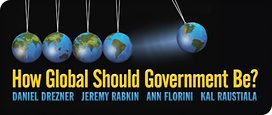There are two threads running through these essays. The first is about who is actually running the world, which probably is of concern mostly to scholars and pundits. The second is, who should be running the world, and toward what ends.
On the first, Dan, I think you don’t really mean your original assertion that “small states and nonstate actors do not affect governance outcomes.” Frequently they do. Certainly businesses have a big impact on regulatory decisions at national and particularly international levels. In areas from Internet governance to the insurance industry phytosanitary standards, there’s a lot of “self-regulation” going on, with private actors negotiating and setting the rules themselves. With regard to civil society, the 1990s saw an explosion of books documenting the impact of transnational civil society networks on one issue after another, from landmines to nuclear arms control to most environmental issues. No, of course civil society groups do not independently make and enforce policy. But they do matter, a lot and often.
Dan, your more interesting point is that, as Kal noted, the world remains “bumpy,” not flat. Even the powerful forces behind economic integration aren’t driving the world to a uniform stage of policy convergence. That means the real question is: what explains the bumpiness? Or, in your terms, under what conditions do states retain substantial autonomy to set regulatory policy in the era of globalization? That’s the question you really seem to be addressing. Your answer seems to be: “great powers with clearly defined interests can resist pressures for policy convegence.” I completely agree. State power still matters. But it is not all that matters, because most states aren’t great powers, and most great powers frequently have pretty cloudy and changeable ideas of what constitutes their own interests.
That is both good news and bad, because it means there are multiple options for running the world. Sometimes it will be great power agreement, sometimes not. Usually it’s an unholy mess with many contending actors. But what is lacking in almost all of these options are well-developed procedures for ensuring that people affected by the rules have some input into making them, and some way of holding rule-makers accountable. How should global rules be set?
Kal’s right that we are moving, without much thought, into a world where matters that used to be handled at the domestic level are being addressed internationally. But people have spent centuries developing procedures to provide for at least a modicum of public participation in and accountability of national-level decision making systems. Those administrative law procedures, with all their flaws, are crucial. They fill in the gap between the blunt instrument of elections and the day-to-day rulemaking that has such an enormous impact on people’s lives. They allow people affected by rules and proposed rules to comment on those rules, pursue judicial remedies to bureaucracy run amok, etc.
Global administrative law, by contrast, is woefully underdeveloped. That’s why, as Kal notes, we hear so much now about demands for transparency and accountability at the WTO, the IMF, and the World Bank. That’s why humanitarian relief groups have banded together in the “Humanitarian Accountability Project” to develop rules so that the intended beneficiaries – refugees and internally displaced persons needing humanitarian relief – have some voice in how the relief groups treat them.
So we’re in a messy stage of global governance. The big question now is, what do we do about it?

